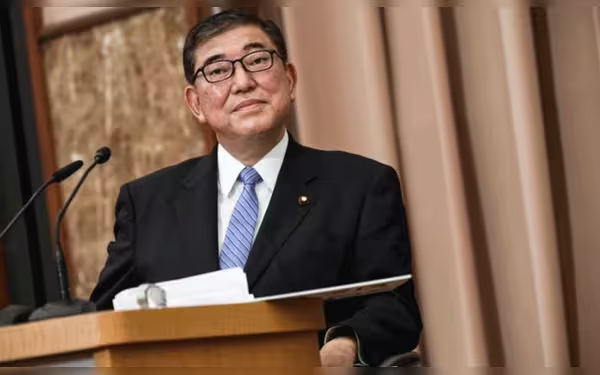Saturday, November 16, 2024 09:55 PM
Japan PM Strengthens Defense Alliance with Trump
- Japan aims to enhance military capabilities amid Trump's policies.
- Ishiba seeks early meeting with 'very friendly' Trump.
- Japan collaborates with EU on new fighter jet development.
 Image Credits: brecorder
Image Credits: brecorderJapan's PM Ishiba commits to strengthening defense ties with Trump, focusing on military capabilities and collaboration with the EU.
In recent developments, Japanese Prime Minister Shigeru Ishiba has expressed his commitment to strengthening the defense alliance between Japan and the United States. This announcement comes on the heels of a phone call with US president-elect Donald Trump, whose recent victory has sparked a surge in defense-related stocks. The implications of Trump's 'America First' policy raise concerns among analysts about potential reductions in financial support for security in the Asia-Pacific region. As a result, investors are increasingly optimistic about Japan enhancing its military capabilities.
Japan and the United States share a robust economic relationship, with each nation being the other's top foreign investor. Currently, approximately 54,000 US military personnel are stationed in Japan, primarily in Okinawa, which is located east of Taiwan. Ishiba, who has been in office for just over a month, is eager to arrange a face-to-face meeting with Trump at the earliest opportunity. He described the president-elect as 'very friendly' and expressed confidence in their ability to engage in candid discussions.
During his remarks, Ishiba emphasized the importance of not only discussing financial aspects but also focusing on specific military equipment, operations, and integration. This approach reflects Japan's ongoing efforts to double its military spending to meet NATO's standard of two percent of GDP. Claudia Junghyun Kim, an assistant professor of international affairs, noted that Trump's expectations for allies to contribute more to their own defense align with Ishiba's ambitions to increase Japan's defense budget. This synergy could bode well for Japan's defense industry.
Following Trump's previous election victory in 2016, then-prime minister Shinzo Abe was the first foreign leader to meet him. Japanese media speculate that Ishiba may plan a visit to the United States around the time of the Asia-Pacific Economic Cooperation (APEC) summit in Peru this month. However, experts suggest that Ishiba may face challenges in establishing rapport with Trump, given their differing personal interests. Unlike Abe, who was known for his social skills, Ishiba is a railway enthusiast who does not particularly enjoy golf or social dinners, which could hinder their personal chemistry.
Both leaders view the US-Japan alliance as unequal, albeit from different perspectives, which may complicate productive discussions. Ishiba's recent leadership of a ruling coalition that suffered a significant loss in snap elections adds another layer of complexity to his position. He is now expected to lead a minority government or expand the coalition to include other parties.
In a broader context, Japan and the European Union recently announced a comprehensive new security and defense pact. Experts emphasize the importance of Tokyo developing a defense ecosystem that fosters joint production with other countries. Historically reliant on the United States for military hardware, Japan is also collaborating with EU member nations, including Italy and Britain, to develop a new fighter jet expected to take to the skies by 2035.
As Japan navigates its defense strategy in a changing geopolitical landscape, the strengthening of its alliance with the United States under Trump's leadership could have significant implications for regional security. The evolving dynamics of international relations will undoubtedly shape the future of defense collaborations, and Japan's proactive stance may serve as a model for other nations seeking to enhance their military capabilities.













